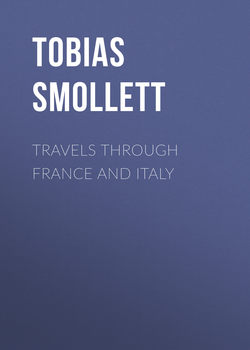Travels through France and Italy

Реклама. ООО «ЛитРес», ИНН: 7719571260.
Оглавление
Tobias Smollett. Travels through France and Italy
INTRODUCTION By Thomas Seccombe
I
II
III
IV
V
VI
VII
LETTER I
LETTER II
LETTER III
LETTER IV
LETTER V
LETTER VI
LETTER VII
LETTER VIII
LETTER IX
LETTER X
LETTER XI
LETTER XII
LETTER XIII
LETTER, XIV
LETTER XV
LETTER XVI
LETTER XVII
LETTER XVIII
LETTER XIX
LETTER XX
LETTER XXI
LETTER XXII
LETTER XXIII
LETTER XXIV
LETTER XXV
LETTER XXVI
LETTER XXVII
LETTER XXVIII
LETTER XXIX
LETTER XXX
LETTER XXXI
LETTER XXXII
LETTER XXXIII
LETTER XXXIV
LETTER XXXV
LETTER XXXVI
LETTER XXXVII
LETTER XXXVIII
LETTER XXXIX
LETTER XL
LETTER XLI
Отрывок из книги
Many pens have been burnished this year of grace for the purpose of celebrating with befitting honour the second centenary of the birth of Henry Fielding; but it is more than doubtful if, when the right date occurs in March 1921, anything like the same alacrity will be shown to commemorate one who was for many years, and by such judges as Scott, Hazlitt, and Charles Dickens, considered Fielding's complement and absolute co-equal (to say the least) in literary achievement. Smollett's fame, indeed, seems to have fallen upon an unprosperous curve. The coarseness of his fortunate rival is condoned, while his is condemned without appeal. Smollett's value is assessed without discrimination at that of his least worthy productions, and the historical value of his work as a prime modeller of all kinds of new literary material is overlooked. Consider for a moment as not wholly unworthy of attention his mere versatility as a man of letters. Apart from Roderick Random and its successors, which gave him a European fame, he wrote a standard history, and a standard version of Don Quixote (both of which held their ground against all comers for over a century). He created both satirical and romantic types, he wrote two fine-spirited lyrics, and launched the best Review and most popular magazine of his day. He was the centre of a literary group, the founder to some extent of a school of professional writers, of which strange and novel class, after the "Great Cham of Literature," as he called Dr. Johnson, he affords one of the first satisfactory specimens upon a fairly large scale. He is, indeed, a more satisfactory, because a more independent, example of the new species than the Great Cham himself. The late Professor Beljame has shown us how the milieu was created in which, with no subvention, whether from a patron, a theatre, a political paymaster, a prosperous newspaper or a fashionable subscription-list, an independent writer of the mid-eighteenth century, provided that he was competent, could begin to extort something more than a bare subsistence from the reluctant coffers of the London booksellers. For the purpose of such a demonstration no better illustration could possibly be found, I think, than the career of Dr. Tobias Smollett. And yet, curiously enough, in the collection of critical monographs so well known under the generic title of "English Men of Letters"—a series, by the way, which includes Nathaniel Hawthorne and Maria Edgeworth—no room or place has hitherto been found for Smollett any more than for Ben Jonson, both of them, surely, considerable Men of Letters in the very strictest and most representative sense of the term. Both Jonson and Smollett were to an unusual extent centres of the literary life of their time; and if the great Ben had his tribe of imitators and adulators, Dr. Toby also had his clan of sub-authors, delineated for us by a master hand in the pages of Humphry Clinker. To make Fielding the centre-piece of a group reflecting the literature of his day would be an artistic impossibility. It would be perfectly easy in the case of Smollett, who was descried by critics from afar as a Colossus bestriding the summit of the contemporary Parnassus.
Whatever there may be of truth in these observations upon the eclipse of a once magical name applies with double force to that one of all Smollett's books which has sunk farthest in popular disesteem. Modern editors have gone to the length of excommunicating Smollett's Travels altogether from the fellowship of his Collective Works. Critic has followed critic in denouncing the book as that of a "splenetic" invalid. And yet it is a book for which all English readers have cause to be grateful, not only as a document on Smollett and his times, not only as being in a sense the raison d'etre of the Sentimental Journey, and the precursor in a very special sense of Humphry Clinker, but also as being intrinsically an uncommonly readable book, and even, I venture to assert, in many respects one of Smollett's best. Portions of the work exhibit literary quality of a high order: as a whole it represents a valuable because a rather uncommon view, and as a literary record of travel it is distinguished by a very exceptional veracity.
.....
"His account shows also the absence of hopelessness which is a characteristic state of mind in patients with pulmonary tuberculosis.
"I do not think that the opinion of the Montpellier professor deserves Smollett's condemnation. It seems to me both careful and sensible and contains all the knowledge of its time. Smollett, with an inconsistency not uncommon in patients who feel that they have a serious disease, would not go in person to the Professor, for he felt that from his appearance the Professor would be sure to tell him he had consumption. He half hoped for some other view of the written case in spite of its explicit statements, and when Professor F— wrote that the patient had tubercles in his lungs, this was displeasing to poor Smollett, who had hoped against hope to receive—some other opinion than the only possible one, viz., that he undoubtedly had a consumption certain to prove fatal."
.....